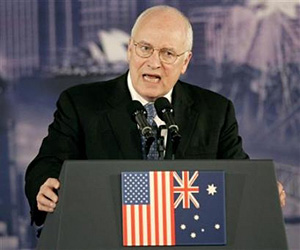 |
 |
 |
 News from Around the Americas | February 2007 News from Around the Americas | February 2007  
Cheney Raises Concerns About China, North Korea
 Caren Bohan - Reuters Caren Bohan - Reuters


| | Vice President Dick Cheney delivers a policy speech about the Australia/U.S. alliance on the Iraq war at a hotel in Sydney, February 23, 2007. (Will Burgess/Reuters) |
Vice President Dick Cheney on Friday expressed concerns about China's military build-up and also questioned whether North Korea would follow through on its commitments in a recent nuclear deal.

Cheney, a leading architect in the Bush administration of the decision to invade Iraq, also stressed the importance of U.S. forces remaining there until it had stabilized.

"The notion that free countries can turn our backs on what happens in places like Afghanistan or Iraq or any other possible safe haven for terrorists is an option that we simply cannot indulge," Cheney said in a speech in Sydney.

"If our coalition withdrew before Iraqis could defend themselves, radical factions would battle for dominance of the country," he told the Australian-American Leadership dialogue.

Cheney arrived in Australia after talks in Tokyo with Japan's Prime Minister Shinzo Abe in which China's military rise and its growing clout in the region were high on the agenda.

Cheney has sought to assure Japan and Australia -- two of Washington's closest allies -- that the U.S. commitment to the Asia-Pacific region would stay strong despite the problems in Iraq.

Though he has a sympathetic audience in both Abe and Australian Prime Minister John Howard for his admonitions against a pullout in Iraq, he has also faced reminders of the war's unpopularity with both the Japanese and Australian public.

Japan's defense minister Fumio Kyuma caused a stir just weeks before Cheney's Tokyo visit by saying that starting the Iraq war was a mistake.

Antiwar protests have marked Cheney's visit to Sydney.

About 50 protesters near his hotel on Friday chanted "Chain Up Cheney" and called for an end to the Iraq war. One woman danced in the street in a skeleton suit, with an American flag over her shoulders, and dragging two bloodied animal carcasses.

CHINA, NORTH KOREA CONCERNS

Cheney praised China's role in six-party talks that led to a February 13 nuclear agreement under which North Korea agreed to disable its main plutonium-producing nuclear complex in return for heavy fuel oil.

"Other actions by the Chinese government send a different message," he said. "Last month's anti-satellite tests, China's continued fast-paced military build up, are less constructive and are not consistent with China's stated goal of a 'peaceful rise'."

Cheney echoed Bush in saying the North Korea deal was a step toward disarmament but he also raised concern about whether Pyongyang would follow through.

"We go into this deal with our eyes open. In light of North Korea's missile test last July, it's nuclear test in October and its record of proliferation and human rights abuses, the regime in Pyongyang has much to prove, yet this agreement represents the first hopeful step toward a better future for the North Korean people," he said.

Some U.S. analysts have speculated that Cheney, known for his hawkish views, was a skeptic of the North Korea deal, but Friday's speech was his first open acknowledgement of caution.

U.S. analyst Michael Fullilove, from Austalia's foreign affairs think tank the Lowy Institute, said he believed Cheney's speech was well balanced on China and shared common ground with both the Japanese and Australian views.

"I thought it was reasonably balanced. He said in relation to China that it had played a useful role in the six-party talks," he said. "On North Korea, I thought he was properly skeptical."

Analyst Ron Huisken, from the Australian National University's Strategic and Defense Studies Center, said the comments could be a sign Cheney had taken over the issue from former Defense Secretary Donald Rumsfeld, and may be aimed at showing Japan it was alert to concerns about China's buildup.

"I don't recall Cheney ever making a major statement raising a dark cloud or a hesitation of a query on China," he said. "He may be stepping up to the plate now that Rumsfeld has gone."

(Additional reporting by James Grubel and Michael Perry) | 
 | |
 |



